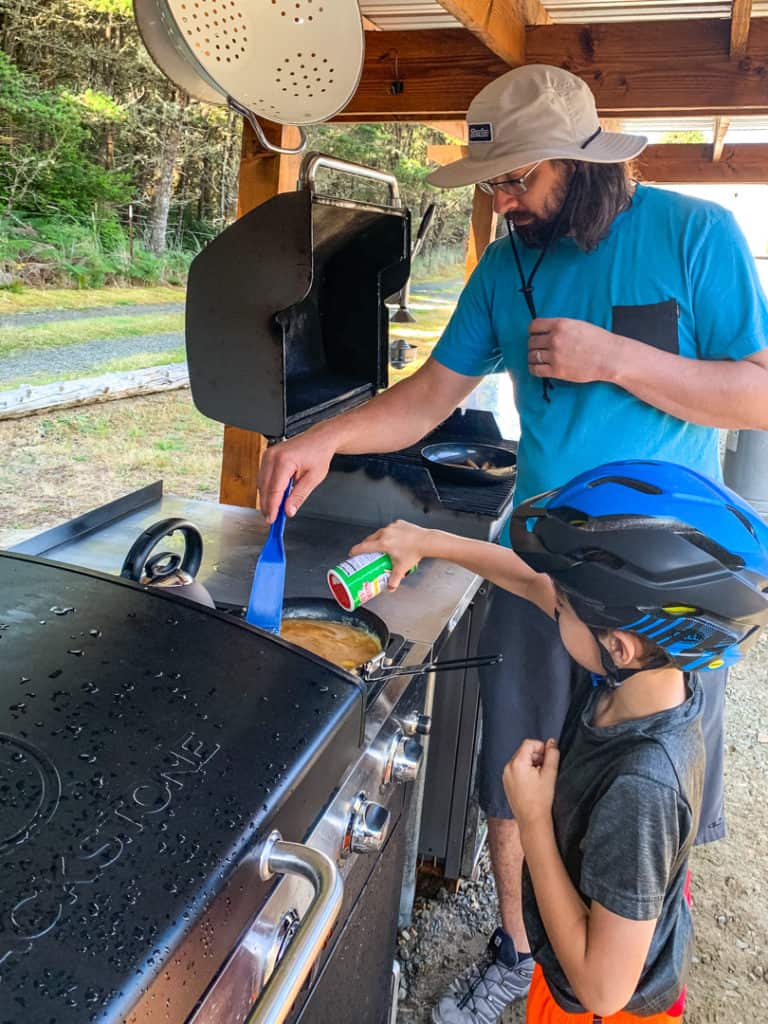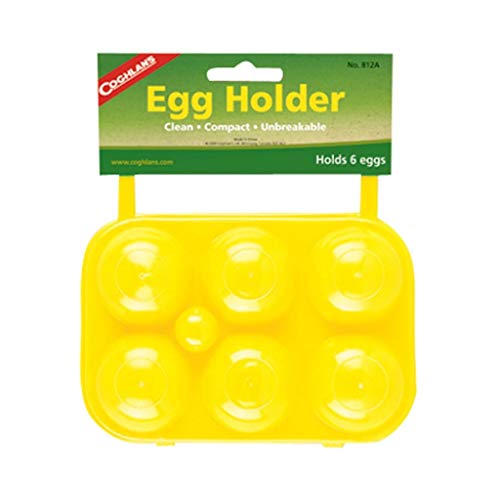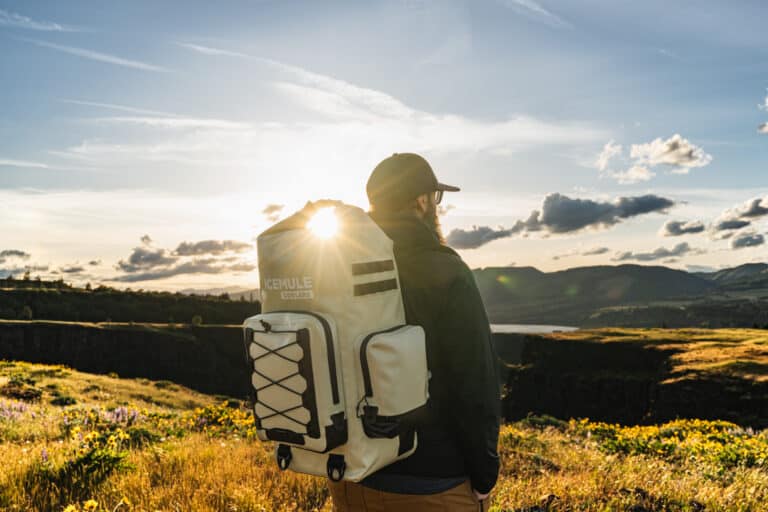Whether this is your first time or you’re a pro, these simple tips on how to pack eggs for camping will ensure you eat a delicious breakfast every day of your trip. Look no further if you’ve been afraid of taking raw eggs on your next camping trip. These different options will work for all types of eggs.
Many campers avoid taking eggs altogether because they’re afraid of them breaking and making a mess. Even if you’ve put them in a sealed bottle, the shells are hard to pick out of the liquid eggs if they break along the way.
But if you love french toast or a fried egg for breakfast while camping, don’t worry. It’s entirely possible! We’ve been successfully bringing eggs camping with us for years. Camping food doesn’t have to be complicated and these tips are the best way to make an egg breakfast on your next trip.
Check out my top car camping essentials!
I’ve been using many of these items for years on car camping trips – and we still use most of them with our truck camper! Whether you are camping in a tent or an RV, these are some of my favorite brands and tried and true gear finds including:
How to Pack Eggs in Different Forms for Camping

Whole Eggs
One option is to pack whole eggs into an egg holder or egg carton with individual slots for each one. Keep them from being jostled around in the cooler or backpack by wrapping them with bubble wrap. When you get to the campsite, set them in a safe place until you’re ready to use them.
If you prefer whole eggs when camping, this container is a great option! It's durable, dishwasher safe, and designed to be virtually unbreakable. It's also available in multiple sizes to fit either 2, 6, or 12 eggs.
Another option is to put the eggs in a wide-mouth water bottle. The key is to keep them from hitting each other or the sides of the container with so much force that they break. This can be difficult to control when driving or hiking.
Crack the eggs right into the pan when you’re ready to eat breakfast. This is the best option if you love whole, fried eggs rather than scrambled ones.
This method is perhaps the easiest in terms of prep, but it’s much more likely for the shells to break before you’re ready to cook breakfast.

Cracked Eggs
An excellent alternative to bringing whole eggs is to crack them into an airtight container like a mason jar or water bottle. You can even give them a good shake or stir them with a fork or whisk before taking off to save yourself a bit of time at the campground. All you need to do at that point is pour them right into a hot, buttered pan or use them to batter fresh bread to make french toast.
This is the method we use the most often. We like to use a shaker bottle like this. If we’re planning to eat our eggs scrambled, we’ll go ahead and shake them up and pre-season with salt and pepper.
We’ve also used a modified version of this method for whole eggs. Instead of shaking to scramble, we crack whole eggs into the container and pack it securely into our cooler, where it’s least likely to get jostled. Then, when we’re ready to fry an egg, we pour or scoop out one egg yolk and a bit of egg white. This method isn’t foolproof; sometimes, the yolks will break during transport. Still, in that case, we simply adjust and have scrambled eggs or an omelet instead.
Liquid eggs are much easier to contain, and you don’t need to worry about the shells breaking. You also don’t have to face the decision to pick out the shells or just throw out the eggs, which would be a shame.
Whichever container you use for this method, be sure the liquid eggs are sealed tightly. This will prevent a soggy mess in the bottom of your cooler or backpack. That’s certainly not fun to clean up!

Powdered Eggs
If you prefer food options that don’t require a cooler, powdered or dehydrated eggs are another great way to take eggs with you while camping. You can quickly rehydrate them with water when you’re ready to make breakfast.
They’re perfect for including in a breakfast hash with potatoes, bacon, onions, garlic, bell peppers, and other veggies. Or for making french toast or scrambled eggs.
If you know you won't be able to maintain the proper temperatures or are worried about breakage, powdered eggs might be the best choice for you. These from Judee's are gluten-free and nut-free and easy for camping!
Dried eggs are perhaps the best way to keep eggs fresh for the longest time. There’s no need to control their temperature, so you can take them with you even if you don’t bring a cooler or plan to go on a long road trip. They have a long shelf life and are the safest way to travel with eggs without cooler packs.
You can keep them in a plastic bottle or Ziploc bag for easy storage and portability. The only downside to powdered eggs is that the texture simply isn’t as good as fresh eggs.

Hard-Boiled Eggs
Another option is to take hard-boiled eggs instead of raw eggs. This is a good idea if you plan on making egg salad for lunch or like to snack on a great source of protein while hiking.
Keep them bundled in a plastic container so the shells have less chance of breaking or getting smushed. You can also remove the shells and keep the eggs in a plastic bag in the cooler. Another option is to slice them in half and remove the egg yolks if you only like egg whites. This takes up a lot less space and leaves room for other snacks or ingredients that need to be kept cool.
Keep in mind that since they’re cooked, it’s even more important to keep them cool and at the appropriate temperature to prevent bacterial growth. This is something you can’t see, so it’s essential to pack them properly.
Additional Tips for Packing Eggs While Camping
Pack your eggs in a cool, dry place, and avoid putting them at the bottom of the cooler. An insulated bag or a hard-sided cooler are excellent methods of keeping them cool while traveling in the car and on the hike to your campground.

What To Do With The Shells
Once you’ve made breakfast with the eggs you’ve packed in, what do you do with the shells? If this is your first time camping or you’re new to the whole thing, you may wonder what you should do with them.
There are a couple of things you can do in this case. It’s always the best policy to follow proper camping etiquette and leave nothing behind when you leave your campsite. You can keep the eggshells in a plastic bag and take them back with you (crush them to save on space) to compost or throw away properly. Alternatively, if you’re at a campground, you can dispose of them in the appropriate receptacle.
Either way, it’s important not to just leave them scattered around your campsite. Not only will this attract wild animals, but it’s also inconsiderate to people who come after you. While eggshells are compostable, it’s always best to dispose of them properly.
If you don’t want to worry about this at all, bring cracked or dehydrated eggs with you instead.
Food Safety
One thing to keep in mind when taking eggs with you when camping is that they need to be kept between 32° – 40°F for the duration of the trip. Maintaining proper temperature is essential to avoid potential sickness. This means they’ll need adequate insulation and to be packed in a cooler with freezer packs or bundled up with ice packs.
This will help prevent bacteria growth and potential food poisoning, which is not fun at home, let alone on your camping trip!
Store-bought eggs are pasteurized before they reach the grocery store, so there’s less chance of contamination. They won’t be pasteurized if you buy them from a farmer’s market. However, if they are unwashed, they will still have bloom (the protective coating left by the laying hen), reducing the chances of contamination. However, if you’re unsure whether they were washed before your purchase, you may want to keep a closer eye on how they’re packed.
If you’re worried about this, an easy way to avoid the whole thing is to bring dehydrated eggs instead of raw eggs. This way, you can skip the entire thing and save space in your cooler.
Don’t Forget Cleaning Supplies!
One thing to remember when packing eggs is to bring cleaning supplies just in case they break or leak out of their container. If you’ve tried cleaning up eggs from the floor, you’ll know that it can get quite messy.
Bring dry paper towels or cloth towels to wipe up any leaks or messes. Wipes are also a good idea to clean your hands or other things that may have gotten eggs on them. Baby wipes work great for this and are easy to pack. They also work great for cleaning supplies, kids’ soot-covered hands, and dirt-smeared faces.
We also like to bring sanitizing wipes or spray for raw egg or meat spills to kill bacteria after cleaning the bulk of the mess.
A bag for trash is also a good idea for things you need to take back with you.

How do powdered eggs work?
Powdered eggs are essentially eggs that have been dehydrated so they are easy to transport and store. They do not require refrigeration making them ideal for situations like camping or backpacking. When you’re ready to eat, you mix the powder with water, let it sit for a few minutes, then scramble like you would with regular eggs.
Can you take hardboiled eggs camping?
Absolutely! Taking hardboiled eggs camping is a fantastic idea. They’re not only a convenient ready-to-eat snack or breakfast option, but they’re also loaded with protein. Plus, they’re great to eat on the go when your kids would rather run around than sit down to eat! 😉 Just remember to store them properly in an airtight container in your cooler or camping fridge to keep them fresh.
How do you transport eggs without a carton?
To transport whole eggs without a carton, you’ll want to make sure they have some form of cushioning to prevent breaking. A few options are: wrapping individually in bubble wrap or newspaper, placing eggs on a layer of sawdust in a box (top with more sawdust), or purchasing a reusable egg holder.
Final Thoughts On How To Pack Eggs For Camping
Camping is fun for many reasons, not least of which is a delicious breakfast! Make your next camping trip the best one yet with a hot egg breakfast on chilly mountain mornings.
Whether you decide to bring whole eggs, crack them into a bottle, prep and hard boil them ahead of time, or bring along dehydrated eggs, with these simple tips, you’ll be able to eat this healthy food while camping.











Hi Tiffany,
Here is something.
You do not need to refrigerate your eggs!
At all!
In fact in Europe eggs are found on the shelves, not in the fridge.
Once refrigerated they do need to be kept refrigerated. Or if they have been washed, they will need to be refrigerated.
If you can get fresh eggs, they will keep fresh on the shelf .
Lower temp being better of course.
If you can get fresh eggs but they have been washed, you can coat them with… petroleum gelly and they will keep, we are talking months here.
The Coghlan’s Egg Holder you are suggesting is what we have on our boat, it is perfect! Pour the gelly in your palm, coat the egg, put in the holder. Close the lid. Done.
Rgds,
a.
Hi Alain,
Here in the US, eggs bought in the store will still need to be refrigerated because they have been washed.
But, yes! As long as they haven’t been washed, they’ll still be coated in bloom and safe at room temp. We had chickens at our last house and we stored them on the counter until we were ready to use.
I haven’t tried the petroleum on washed eggs, but I know some people do this. I’m not comfortable recommending it though as there are a lot of other factors at play (and sources like USU advise against it.)
And, yes – I agree! The Coghlan’s Egg Holder is such a great option for egg storage.
Tiffany